Peter MALONE
Saturday, 18 September 2021 19:21
Terror By Night
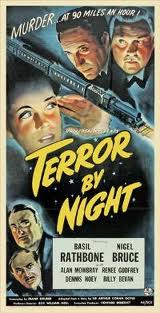
TERROR BY NIGHT
US, 1946, 60 minutes, Black and white.
Basil Rathbone, Nigel Bruce, Alan Mowbray.
Directed by Roy William Neill.
Terror By Night is an enjoyable Sherlock Holmes story, one of the last made by Basil Rathbone and Nigel Bruce. It has the advantage of an overnight train setting, reminiscent of so many thrillers.
1.An enjoyable Sherlock Holmes story? Popularity of Holmes and Watson? This particular series?
2.B-budget production? Black and white photography? Studio and sets? Atmosphere of England? Musical score?
3.The basis in Conan Doyle stories? Adaptation and updating?
4.Sherlock Holmes, his reputation? Relationship with Watson? Needing cases? Professor Moriarty and his associates? His involvement in the case? Hired for protection? Travelling to Edinburgh? His self-assurance, clues? Lady Margaret and her son? The death? The interrogations? His suspicions of Watson's friend from India? The resolution of the case? The corpse? The struggle and Holmes outwitting the false police? Inspector Lestrade and his involvement?
5.Dr Watson, his bumbling style, his Indian friend, lack of suspicions, indicating clues? His surprise at the unmasking?
6.The colonel, hail-fellow-well-met? Friendship with Watson? His disguise, his accomplices? The stealing of the jewel? The false police and the struggle?
7.The passengers on the train, their suspicions and upset? Lady Margaret and her haughtiness, the death of her son? The guards van and the coffin?
8.The unmasking of the criminal? The final fight? Holmes's achievement? Watson's support?
Published in Movie Reviews
Published in
Movie Reviews
Tagged under
Saturday, 18 September 2021 19:21
Terminal/ Robin Cook's Terminal
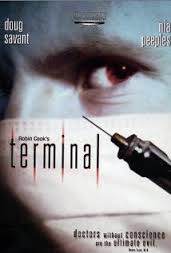
TERMINAL (ROBIN COOK'S TERMINAL)
US, 1996, 90 minutes, Colour.
Doug Savant, Khandi Alexander, Michael Ironside, Nia Peeples.
Directed by Larry Elikann.
Terminal (Robin Cook's Terminal) is a routine and predictable medical thriller. However, it does have the distinction of being an adaptation of Robin Cook's novels - a novelist who combines the techniques of thriller and mystery with his own medical background. (Michael Crichton - also a doctor - directed the film version of Cook's Coma in 1978.)
The film was produced in the mid-'90s, capitalising on the popularity of television medical series from St Elsewhere to the very popular ER and Chicago Hope. Doug Savant (of Melrose Place) plays the lead. Michael Ironside is once again a sinister villain. The supporting cast includes Nia Peeples (Made in America).
While the material is predictable, it is enjoyable watching it and anticipating the events and the confrontations.
1.Entertaining telemovie? Murder mystery? Medical thriller? The comment on the medical profession and hospitals?
2.The city locations, Boston and Phoenix? The hospital settings? Apartments? The sequences for the climax - morgue and underground corridors? The musical score?
3.The title and expectations? Cook's comment on cures for cancer, money for research, the medical profession and its contributing to the development rather than the healing of cancer? The film's critique of greed, of noble motivations being corrupted by the need for money?
4.The opening, the taking of the sample, Margaret and the injection? The investigator being pursued, the attack in the room, her hiding the sample, her death?
5.Sean O' Grady and his brother? The company and the need for investigating what was going on in Phoenix? Shane and his scholarship? The bond between the two brothers? His arrival, encountering Janet and the memories of their past relationship, her coldness? His being welcomed by Sterling? Welcomed to the hospital and research? The suspicious black doctor? Margaret and her suspicions? His settling into work? His friend's father and the daughter's illness, her coming to Phoenix, his wanting to help?
6.Janet, her research, relationship with Shane? Their sparring? Her getting the information about the little girl? His standing her up for dinner? The continued hostilities? Suspicions, going to the morgue, Margaret's pursuit? The growing dangers? The confrontation with the doctor during the evacuation of the hospital, tying her up? Sterling's pursuit, the fight? The vindication?
7.Sterling, the company, his meeting Shane? Suspicious presence? The villain, his network, hold over the doctor, Margaret? His henchmen pursuing the investigator and killing her? His confrontation with Shane and Janet, the fight? His murdering of Shane's brother? His own death?
8.The doctor and the experiments, the cure for cancer, the money grants and the philanthropist donations? The scam to inject the rich people with the cancer and then cure them? Things going wrong with the little girl and her death? Janet and her pretending to break the sample, discovering the phials? Margaret and the injections? Margaret and her loyalty to the doctor - and her dressing up and her imaginary dinner with the doctor's photo on the table? Her pursuit of Shane and Janet to the morgue, her death? The doctor and his final disillusionment - confrontation with Sterling and his death?
9.Shane and his brother, the company and their investigations, his coming to Phoenix, met by Sterling, the confrontation - the chase and his death?
10.The suspicious doctor, her antipathy towards Shane? Tying her up? Her not knowing what was going on? The collaboration with the security guard - and their apology?
11.The medical background? Audiences and the interest in cures for cancer? The good work of research in hospitals? Disillusionment with the schemes for getting money for research?
12.The ingredients of the murder mystery, the popular thriller - satisfyingly set in the medical and hospital context?
Published in Movie Reviews
Published in
Movie Reviews
Tagged under
Saturday, 18 September 2021 19:21
Terminal Entry
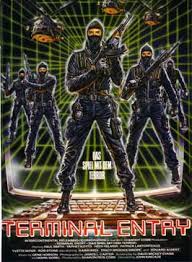
TERMINAL ENTRY
US, 1987, 95 minutes, Colour.
Yaphet Kotto, Edward Albert.
Directed by John Kincade.
Terminal Entry is an action thriller, a small budget thriller which exploits popular themes like terrorism and computer hackers becoming involved in war games - also with exploitive touches of sex and violence. Given this style, it is not without interest and excitement. The film shows action of terrorists, the Americans trying to combat this terrorism. However, things become very complicated when a group of teenagers actually enter into the programs for the destruction plans of the terrorists and these begin to be acted out. There has to be, of course, a rescue by the Americans - and all ends well. The film has an international cast but is led by Americans Yaphet Kotto and Edward Albert.
1.Interesting thriller? Exploiting themes from other films? The exploitive touches of sex and violence? '80s B-budget film?
2.American location, the border? The city? The technology, computers? Special effects and stunt work? Musical score?
3.The title and its ambiguities - with relationship to the Americans, to the terrorists, to the teenagers?
4.The plausibility of the plot: the picture of the terrorists, entering America, wreaking havoc? The American squads sent to combat them? The possibility of teenagers, their computers, computer game mentality? The dangers in which they found themselves?
5.The picture of the Americans: the leadership of Colonel Styles, Jackson and his skills? Pursuing the terrorists? Jackson's girlfriend, on the news, giving information, the scenario of her death to deceive the terrorists? Her being held in captivity? The fast action? Stewart and his clashes with styles and Jackson, enlisting them on his service? Confrontation of the terrorists? The discovery about the teenagers, the rescue? Conventional characterisations?
6.The teenagers, their computer games, their skills, going away for the weekend, together, the glimpses of their characters, sexual relationships? The dangers, their putting themselves on the hit list? The terrorist attack? The American rescues?
7.Popular action adventure, B-budget style, the sensationalist touch?
Published in Movie Reviews
Published in
Movie Reviews
Tagged under
Saturday, 18 September 2021 19:21
Taxi Zum Klo
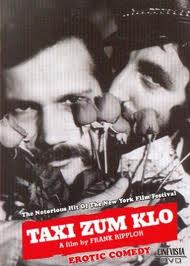
TAXI ZUM KLO
West Germany, 1981, 92 minutes, Colour.
Bernd Broaderup, Frank Ripploh.
Directed by Frank Ripploh.
Taxi Zum Klo was written and directed by gay film-maker Frank Ripploh. The film also stars himself in a central (even narcissistic) role and performance.
The film is designed for gay sensibilities. However, it was marketed for universal release. The film focuses on Frank, his background and relationship with his mother, his picking up men and their abusing and robbing him, his friendships, his work. His behaviour, relationships, sexual activity are presented in somewhat explicit style.
His mother pressurises him to marry, he employs an actress to go through the formalities of marriage with him. Much of the screenplay is given to the planning as well as the ceremony - however, Frank is carrying on with male friends even at the ceremony.
He takes his wife to his home, there is a neighbour, a computer expert who rides naked in the morning. The expert has a seductive eye on Frank's wife - as well as experiencing a homosexual encounter with Frank. Frank is also involved with a Turkish model for photography. (There is ironic presentation of neighbours with eyes scandalised and askance at Frank's behaviour.)
There is also some presentation of aversion therapy for the cure of homosexuality (reminiscent of A Clockwork Orange for Alex and his violence). The film pokes fun at the attempts of aversion therapy to cure homosexual orientation and behaviour. Finally Frank escapes and goes back to his ordinary life.
The film is part of the German film industry of the 1980s as well as the movement for a gay cinema. Ripploh is irreverent, has a sense of humour, is quite open about his behaviour and his amoral stances.
Published in Movie Reviews
Published in
Movie Reviews
Tagged under
Saturday, 18 September 2021 19:21
Tatie Danielle
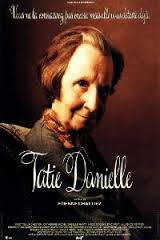
TATIE DANIELLE
France, 1990, 112 minutes, Colour.
Tsilla Chelton, Catherine Jacob.
Directed by Etienne Chatillez
Tatie Danielle is a film that is both appealing and appalling. It is the collaboration between Etienne Chatiliez, director, and Florence Quentin, writer. Their previous film was the successful Life is a Long Quiet River.
With Tatie Danielle they have created a screen monster. She is brought to extraordinary life by the actress Tsilla Chelton. She is unforgettable. Tatie Danielle is a very selfish old woman who lives in Auxerre, the widow of a colonel to whose photo she talks each night. She is also a tyrant, driving her housekeeper, Odile, mad. However, she has a sympathetic German Shepherd called On Your Mark. She makes life difficult for everybody, getting her own way with every whim. She wanders around the town, causing mischief, spurning beggars, spying on people. When she causes Odile's death, the perfectly nice family who come to visit her annually (which she abhors), take her into their home after she has divided the inheritance between them. She again causes misery to them all. Eventually, they go on a holiday and they employ Sandrine to look after her. In Sandrine, Tatie Danielle meets her match. There is an ironic ending where the exasperated family comes together, feeling guilty about their treatment of Tatie Danielle and brought to court, but vindicated. Tatie Danielle runs away and is last seen enjoying herself at a ski resort with Sandrine.
Tatie Danielle is truly a monster. What she does is often appalling. While the family might be silly in their own ways, they certainly don't deserve Auntie's treatment. One laughs, one is amazed - and even appalled.
1.The success of this film in French cinema? Overseas? The French style, sensibilities?
2.The city of Auxerre, of Paris? The contrast between town and city? Homes, shops, streets - the contemporary atmosphere? The musical score, especially the opening and the ending?
3.The focus on Tatie, the strength of performance by the actress, her screen presence? Appearance, looking into the screen, her quizzical eyes? Humour, ironic? Repellent? Any audience sympathy for Tatie? Anger with her behaviour? Audiences able to identify with her or not?
4.Her age, widowhood? The photo of Edouard, cross-eyed? Dead 50 years? The dog called after his campaign? Her continued talking to him, the comfort of her life? Insight into her? How sane, how insane? Her cruelty towards Odile, making her do all kinds of work, clean the chandelier, go messages, drive the car? Waking her up in the night, wanting food, opening doors when Odile shut them? Her reading, yet spying on Odile, looking out the window? Going out devouring the food, the cakes? Her nastiness around the town, with beggars? Causing traffic difficulties? The bank? Odile and the chandelier, her death? Her use of On Your Mark?
5.The letter arriving from the family, the preparation for the visit, seeing it as a treat? Her disdainful attitude towards the relatives? Getting presents? Looking down her nose at them? Odile's death, the funeral, the dividing up of the property, the decisions, the house, the dog? The visit from the neighbour and the neighbourly tenderness? Tatie's ridiculing of them?
6.Tatie's nephew and his wife? His working in computers, her beauty parlour? At the visit? His pleasant office, nice house? Tatie's going to the house? Their trying to cope? Catherine and her attentions? The children? Her nephew? His sister and her relationship? Coming into the house? Critical? Catherine, the phone calls, Agathe and the clients? Catherine at work in the beauty parlour and the whims of the clients? The little boy playing, drawing, Tatie losing him in the park and his being upset? The older son, his studies, his friends, the dancing, the latent homosexuality? The way they were all treated? The behaviour at home with the meals, the food, tantrums, clothes? The family and their exasperation, the advertisement, the interviews, employing Sandrine? The characters of the family - neatly drawn with sympathy and satire? The sister and her pregnancy?
7.Tatie and home, her relationship with each of the family, eating, being sick, talking to Edouard?
8.The build-up to the vacation, Sandrine, her arrival, the interview with Catherine, her treatment of Tatie, the wetting the bed, the slaps, the food, Tatie apologising? Her boyfriend and his staying? The question of the money, the loan, the car? Going out, sharing with Sandrine, Sandrine receiving the gift of the scarab? Tatie liking her?
9.Sandrine and Michael, going out, Tatie and her reaction, being sick, setting the fire, drinking? The destruction of the house? The rescue, sympathies, the hospitals, the media?
10.The family returning from holidays, the attack on them, the media, the interviews, the police? The final emerging of the truth? Their exhaustion?
11.Her going to the old people's home? Her treatment of everybody there, the TV lady, her nastiness to everyone? The staff and their lack of sympathy? Bringing it on herself?
12.Sandrine, her return, the disaster? Going off? Tatie running away? Sandrine and Tatie at the ski resort - mirror images of each other? Two of a kind?
13.The presentation of nice people and nasty people? Seriously? Humorously? The effect of watching this family and Auntie's interactions? (And the advertisement line: You haven't met her yet and she already hates you.)
Published in Movie Reviews
Published in
Movie Reviews
Tagged under
Saturday, 18 September 2021 19:21
Tarflowers

TARFLOWERS
Australia, 1994, 50 minutes, Colour.
David Woloszko, Joan Lord, Robin Cuming, Pat Thomson, Max Fairchild, Sheila Kenelly, Les Foxcroft.
Directed by Tom Jeffrey.
Tarflowers was written by Terry Larson (FJ Holden, Midnight Spares) and directed by Tom Jeffrey - whose name does not appear on the final print. Instead, there is a credit to Geoffrey Bennett as artistic adviser.
The film is one of the original Winners series. It is a fantasy: a young man, intellectually handicapped, Kev, paints flowers on concrete and on walls in Sydney's Newtown. He encounters a wide range of people, some street people, the four-year-old little girl next door, and the welcoming garbage men in the area. However, Mrs Pearl of the Welcome Inn, the caricature of a social do-gooder, pursues him as a vandal.
While the film shows something of Sydney's inner suburban life, the fantasy tone and the optimism about the poor and marginalised comes to a Winners ending with the mural of the tar flowers bursting into life.
1.The Winners series: popularity, the aim of presenting a positive image of youngsters? This film's place in the series?
2.The short length, the visual style, editing, voice-over, storybook? The telemovie designed for the family audience?
3.The blend of realism and fantasy? Surrealism with the storybook, the flowers, the magic, the ending? Colour photography, the inner city suburb of Newtown? The score?
4.The title: the fact of the flowers, their symbolism, graffiti, the walls, the beauty and the glow, the colours? Their being preserved? The gardens for an inner city suburb? Their being interpreted as beautiful, as vandalism? The symbol of life in the drab city, transforming the city, the buildings and the people?
5.Newtown as a microcosm of the city, its limits, the families and their lifestyle, the houses, the routines? Kevin's mother, Mary's family? The neighbours? The mixture of good and bad? The activities of Newtown? The ordinary sequences: school, the parks, houses, the church hall? The caricatures with the hostel, the park, the school and Mrs Pearl and the headmaster? A magic world of appearing and disappearing, of magic characters dancing?
6.The focus of the film on Kev: his voice-over, intelligent and commonsense, his not going to school? Out at night, his routine, painting, the garden? The range of his friends, the dancing garbage man, Alec and Guy, Mary? The neighbour? His relationship with his mother? The encounter with Mrs Pearl, going to the Welcome Inn, having to eat, escaping? Her continued pursuit of him? The headmaster and his attack? Alec and guy and their talk? Sid and his friendship? Big, the dog companion? The dancer? Kevin and his routine, his wisdom, not worrying? Mrs Pearl and her changing his life, the rules, obeying? His painting the wall, the aftermath, going to the institution, what happened to him there, getting away? The portrait of a winner? Changing reality, painting on?
7.Kev's mother, the rules, his way of life and her acceptance, the friendship with the neighbours, the attack by Mrs Pearl?
8.Mary, nice little girl, love of colours, friendship, accompanying Kev, shopping, to school? The prospect of going to school? The other children? Sid and his friendship? Theo? The schoolyard, the families?
9.Mrs Pearl and the Welcome Inn, the government grant, making the men eat, their escaping from her, Kev letting them out of the van? The cook? Life at the hostel? Cans and the assembly line? Mrs Pearl and the headmaster, the sandwich? The henchmen and the wet jokes? Mrs Pearl and her wig?
10.Alec and guy and their memories, the dancer, Sid? The ordinary people - and extraordinary?
11.The climax, Kev's escape, the flowers - and their bursting into life?
Published in Movie Reviews
Published in
Movie Reviews
Tagged under
Saturday, 18 September 2021 19:21
Tampopo
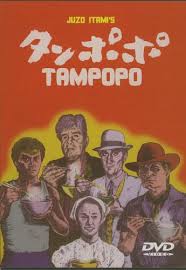
TAMPOPO
Japan, 1986, 117 minutes, Colour.
Directed by Juzo Itami.
Tampopo is a popular Japanese comedy written and directed by Juzo Itami, writer and director of the very popular satire The Funeral, as well as the two A Taxing Woman movies.
Tampopo was advertised as a film about noodles and sex. It also has overtones of the American westerns, particularly Shane. It is a humorous story of a woman trying to run a noodles restaurant, learning how to develop her skills in a great range of ways while fending off difficult customers, being friends with tanker drivers and building up a new Tampopo restaurant.
The plot is interlaced with visual asides: a gangster having a champagne brunch in a cinema, a group of businessmen dining in an expensive restaurant, the gangster and his girlfriend playing erotic games, the gangster shot and collapsing in the streets. These humorous interludes act as a kind of chorus for the main action.
The film is full of humanity - with a light and satiric touch. The film has a lot to say about Japanese traditions, Japanese eating habits - and the influence of the West and commercialism.
1.Popular Japanese comedy? Its popularity outside Japan? The work of the director and his satires?
2.The restaurant environment, the eating section, the kitchen? Tampopo's house? The contrast with the settings for the interludes? Musical score?
3.Tampopo, as a person, woman, proprietress of the restaurant? Pisken and his unwelcome advances? Goro and his milk truck? Gun and his reading, expertise on noodles? The fight with Pisken and Goro and Tampopo looking after him? Her reaction to his criticism of the noodles? Her wanting to become a great cook? The time and motion techniques? The information from the other restaurants? Tampopo, learning, cooking? Looking after the guest who was choking? His chef - and his coming to help Tampopo? The prosperity, the changing of the name of the restaurant? The new opening - and Tampopo a success?
4.Goro, his personality, driving his milk tanker, listening to Gun and his reading? Their interest in noodles? Stopping at the restaurant for the snack, the introduction to Tampopo, the clash with Pisken, Goro as their victim? Tampopo nursing him? His regard for her, his criticism of her noodles? His working with Gun and applying efficiency techniques to the work? His going to the other noodle restaurants, spying out, picking up tips? The master chef (the gynaecologist) and the training of Tampopo in her cooking? The restaurant, the elderly man choking? His recovery? Goro and his final clash with Pisken? Vanquishing him? A genial man?
5.Gun, his friendship with Goro, the driving, reading the book, the appreciation, of noodles? Meeting Tampopo, the fight, Goro and his recovery? Working with Goro for efficiency? Spying things out? His helping Tampopo with the choking man? The new chef? The fight with Pisken? The reconciliation between Goro and Pisken? Gun bringing in his friends, the remodelling of the diner? Pisken and his help, Goro and his help? The redecoration? The final confrontation, Gun going off with Goro?
6.Pisken drinking, admiring Tampopo, the fight, the attack on Goro? His unwelcome attentions? Seeking out Goro for the fight? Their becoming friends? His helping with the restaurant? His own contribution - the onions? His men redecorating the restaurant? The happy ending?
7.The dramatic interludes: their purpose, punctuating the action, the counterpoint? The gangster and his style, the champagne brunch in the cinema, his warning people not to make any noise - and his speaking to the audience? The contrast with the businessman dining, the expensive restaurant - and the irony of the young executive the only one with a knowledge of French? The comment of the teacher of etiquette about the westerners and slurping their noodles - the guest in the restaurant not living up to her expectations? The contrast with the gangster and his girlfriend, the raw egg yolk? The gangster and his memories of the girl who was fishing for oysters? The story of the man with the toothache, the train, the abscess being lanced - and the celebration in the park with ice cream? The story of the crazy woman, spoiling the food in the supermarket, the manager catching her? The manager and his meal, the conman arrested - and the double swindle? His going home, the wife dying, he revives her by asking her to cook for the whole family - and the tongue in cheek action of her dying happily after the compliments on the food? The finale with the gangster, collapsing in the street - and the irony of his dying words to his girlfriend: "Boar intestines stuffed with yam!"? The final image of the film with the mother and the baby at the breast? The sequences in themselves - irony, wit, spoof? As punctuating the action?
8.The evocation of the American westerns, the stranger coming into town, taking over, fighting the villains, helping those who are good - and leaving again (echoes of Shane)?
9.Noodles in the Japanese tradition? Their preparation, delicacy, the way they were cooked, eaten? Various recipes? The importance of the restaurant and its traditions? (And the irony about Chinese noodles!)
10.A tongue in cheek look at contemporary Japan and its traditions? Its cinematic styles?
Published in Movie Reviews
Published in
Movie Reviews
Tagged under
Saturday, 18 September 2021 19:21
Tall in the Saddle
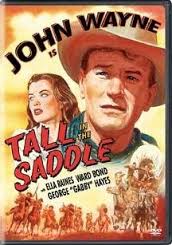
TALL IN THE SADDLE
US, 1944, 87 minutes, Black and white.
John Wayne, Ella Raines, Ward Bond, George `Gabby' Hayes, Audrey Long, Elizabeth Risdon, Don Douglas, Paul Fix, Russell Wade.
Directed by Edwin L. Marin.
Tall in the Saddle is an enjoyable John Wayne western, typical enough of the films of the early '40s. He is matched by a rather vigorous Ella Raines as the heroine. George `Gabby' Hayes leads the supporting cast.
While the movie is one of the west, life in a western town, power-broking amongst the ranchers, it is also a murder mystery.
1.Enjoyable western? Murder mystery? John Wayne western?
2.Black and white photography, the old west? Special effects and stunts? Musical score?
3.The title, the western hero? Rockland as the western hero?
4.The popular western ingredients: the western town, the stagecoach, the coming to town, hero, vigorous heroine, attractive potential heroine, suspicious criminals, shootouts, gunfighters, double-dealings, the final revelation of the villains? Happy ending?
5.John Wayne as Rockland: the mysterious stranger, tough, on the stagecoach, with Dave, antagonism towards women? Arrival in the town? Gunfighters and shootouts? His more peaceful approach? The clash with Harley? The meeting will Haralday and his getting the job? The set-up? The attempted shooting, the clash with Clint? The antagonism towards Judge Garvey? Clara and the attraction, her aunt and her primness, complaints, conspiracy? The confrontation, the help from Dave? The fight with Judge Garvey? The truth about Haralday? The truth about his ownership of the ranch? The ending with Harley?
6.Harley, her stepfather, her looking after her brother Clint, the challenge to Rockland and shooting at him? Her angers, vigour? Falling in love? Meetings with Clara? The happy ending?
7.Clara, the city girl, attraction towards Rockland? Miss Martin as her chaperone? Complaints? Her being in league with Judge Garvey, the letters and the copies? The exposure of the truth? Her return to the city? Miss Martin and her defeat?
8.Judge Garvey, his position in town, playing cards? Clint? In league with Haralday? The cover-ups, the fight? The truth?
9.Dave and his gruffness, the coach, with Miss Martin? Attacked? His cranky manner?
10.Haralday, smooth style, the villain?
11.Clint, playing cards, angers and cheating, backing down? Harley and her dominance? His being killed?
12.Popular ingredients of the western? John Wayne making his mark on movies?
Published in Movie Reviews
Published in
Movie Reviews
Tagged under
Saturday, 18 September 2021 19:21
Talented Mr Ripley, The
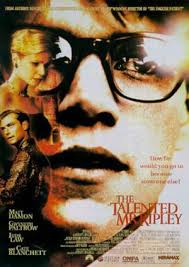
THE TALENTED MR RIPLEY
UK/US, 1999, 127 minutes, Colour.
Matt Damon, Jude Law, Gwyneth Paltrow, Cate Blanchett, Philip Seymour Hoffman, Jack Davenport, Celia Weston.
Directed by Anthony Minghella.
Tom Ripley, the anti-hero of Patricia Highsmith's novels, and the enigmatic shape-changer of Anthony Minghella's stylish thriller, The Talented Mr Ripley, also finds fulfilment on a beach and close to water. But his fulfilment is a sham - his philosophy in believing that it is better to be a false somebody than a true nobody.
Tom Ripley is a chameleon, a New York nobody who can mimic and who can step into somebody else's shoes (and eventually all their clothes and their personality) and dramatise a life and survive from there. The clues that he offers for himself at the film's opening suggest an ambiguous way of life, of search, of love of classical music, of...? Even before he gets the opportunity in Italy to meet Dickie Greenleaf (whose father he has promised to persuade Dickie to return to the US), Tom is infatuated with him and his luxurious and easy-going life style that he immediately studies him, imitates him, becomes him and, in a fit of jealous rage, kills him. As the new Dickie Greenleaf he kills again, like Dickie, not knowing that the real Dickie had been prone to violent outbursts.
The talented Mr Ripley has moved in his questing to assume a contrasting personality, enjoy its style - but is trapped in it as he is forced to save himself ever more murderously. The irony of the story is that Dickie's father wants to see the responsible side of his son in Tom and, despite evidence, cannot bring himself to believe that Tom could be guilty. Tom's assumed appearance is too reassuring.
Anthony Minghella had won an Oscar for The English Patient. His other films include Truly Madly Deeply and Mr Wonderful.
1.The credits and the broken face panels, the jacket for Ripley, playing the piano, a pianist - but filling in? The contrast with the tips and his attendance at the toilet?
2.The opera, his love of music and opera, the Italian songs? The classical concert? His not liking jazz? Playing the piano on the stage, his being caught? His studying jazz to become Dickie Greenleaf?
3.Mr Greenleaf and the presumptions about Tom Ripley, Ripley and his lies, giving the information? Greenleaf's anger at his son, persuading Tom to go to Italy, paying him $1000? Tom Ripley and his grasping the opportunity?
4.Learning the jazz, identifying the records? "My Funny Valentine"?
5.The limousine going to the wharf, the connections with Canard and Greenleaf's influence, opening doors? Meredith and her approach, his almost being found out, his ability to pretend, cover, reach for a lie? Meredith and her false identity?
6.The arrival in Italy, the binoculars, seeing Dickie and Marge? Diving, at the beach, his impersonation of Dickie: "This is my face"? Pretending to meet them by accident, the discussions about Princeton? Marge and her invitations, the relationship? Dickie saying Tom made him laugh?
7.Dickie as character, his American background, wealth, antagonism towards his father? (And Tom mimicking him?) At the beach, boats? The relationship with the Italian girl, the man on the bike, the lie to Marge? The playboy?
8.Marge, her background, nice, practical about money, loving Dickie, wanting to marry him? Sharing his experiences? Yet writing a book? Her liking Tom?
9.The discussion about talents, Tom saying that he was truthful, his capacity for imitating? The dropping of the records? His hooking Dickie, going to the jazz club, Dickie singing, Tom joining in? His open-mouth eagerness to enter into Vickie’s world? Staying? Dickie inviting him to string his father along? The opening up of vistas, visits to Venice, Rome, sailing and skiing? Singing "My Funny Valentine"? Tom getting Dickie to write his signature and interpreting the writing? The playing of chess, the bath sequence, sharing the bath, Dickie's reaction, Tom's cover-up? Dickie's father's letters?
10.The visit to Rome, relaxing, Freddie coming - and his car? Freddie's style and personality, also a man about town? The tour? Dickie discovering Tom singing and in his clothes? Tom and his being hurt, Marge apologising about his not going skiing? The discussions with Marge about Dickie's attention span?
11.The festival, the boats, the statue of the Madonna, the girl's body in the water, Dickie upset? The truth about her pregnancy? Tom cleaning up - wanting to be a brother? The train ride - and the intimations of the homoerotic attraction for Tom? Dickie and his despising Freddie and his taste? The truth from Dickie and the bet that he had had with Marge?
12.On the boat, the two together, the tension, Dickie saying that Tom was a leech, boring? Tom hitting him? The growing anger, Dickie's response and the brutality of the killing? Tom lying beside Dickie after his death? The return to the hotel, the concierge and his wrong identity? The letter, the forging, startling Marge?
13.Tom manipulating Marge and her sadness, his booking into the two hotels, covering his tracks, the phone calls? The meeting with Meredith and the link with Freddie?
14.Meredith and the discussions about money? Seeing him without his shirt? Going to the opera, the encounter with Marge and Peter and his being trapped? Taking Meredith home? His ability at quick thinking and manipulation, manipulating the appointments? Marge upset in hearing that Dickie was at the opera and the stories of Meredith for Marge and Peter?
15.Freddie's visit, the confrontation about the flat - the brutality of the murder, carrying the body, the car and getting rid of the body? The young couple kissing - the policeman and his later evidence?
16.The coming of the police, the bike spill, people thinking that Dickie had killed Freddie? His continued lies, about his hurt face, the reporters and the photos? Covering with the police about not wanting to see Marge? Her tears at the locked door? His typing the suicide note, Tom as friend and brother - and the effect on Marge and the police?
17.Going to Venice, the friendship with Peter, the interrogation by the police, the new inspector, Tom being accused? His discussions about putting his past in a basement and locking the door? The key and inviting Peter to unlock the demons? Let the light in? Peter and the choir, the Stabat Mater? Marge's arrival and her comment about Tom being to the manor born?
18.Mr Greenleaf and his arrival, talking to Tom, Tom's apprehension, learning more about his son, the cutting up of the passport photo? Mr Greenleaf adopting Tom? The bath sequence and Marge's arrival, the cover-up about Dickie's ring? The confrontation with Marge - and his later apologies? Marge's continued hostility?
19.The private detective and Tom's expectations - and the irony of his being praised? The facts about Dickie and his past at Princeton and his violence? Marge's farewell and continued hostility?
20.On the boat, the relationship with Peter, the chance encounter with Meredith? Kissing Meredith and Peter seeing? His denials? Being lost once again in his basement? Asking Peter to give him all the qualities of Tom Ripley? His saying that it was better to be a fake somebody than a real nobody?
21.The adaptation of the novel by Patricia Highsmith, the re-creation of the '50s, the US and Italy? The affluent world of Americans in Europe, the portrait of the man without morals, the personality-less character who absorbed others and entered into their worlds? Tom Ripley's life after these events?
Published in Movie Reviews
Published in
Movie Reviews
Tagged under
Saturday, 18 September 2021 19:21
Taken Away
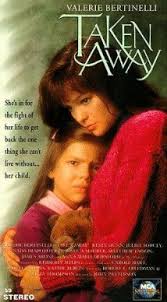
TAKEN AWAY
US, 1989, 94 minutes, Colour.
Valerie Bertinelli, Kevin Dunn.
Directed by John D.Patterson.
Taken Away is a forceful telemovie about a young single mother, her trying to bring up her daughter, an accident and the authorities intervening and taking away her daughter. It is quite realistic, set in a context of women of limited means, abilities, trying to better themselves, overcome their past. The film shows the relationship between mother and daughter, the right of authorities to intervene and the presumptions that they must make. It also highlights Legal Aid and the justice system.
Valerie Bertinelli is good as the mother. The rest of the characters perform credibly - especially in a movie designed for a very wide and popular audience watching television.
Youth groups and students in high school could well benefit by seeing the movie and reflecting on and discussing the issues and characters.
1.Impact of the telemovie? Themes and treatment? For a wide audience?
2.The American city, apartments, the courts, Legal Aid, institutions for children?
3.The credibility of characters, situations, perspectives?
4.Stephanie and Abby, at home, the absent father and the divorce, Stephanie and her computer study, the pressure of the exams, her job? Brenda looking after Abby? The background of Stephanie's mother's death? Her mother looking after her? Her being persuaded by Abby to leave her alone for some hours?
5.Abby alone, playing, wanting to do something for her mother, the accident? The audience knowing the truth? Ringing Emergency? The police, their reaction, photos, questions, the interrogation, the physical examination, the presumptions? The reactions of police, staff? Mrs Pearson?
6.Stephanie and her reaction, the loss, wary? Brenda's support? The police, creating scenes? Going to Legal Aid, before the judge and her outbursts, damaging her case? Going to the institution and her outburst? Her behaving better, going to see Abby, the chicken pox? The discussions with Brenda and Brenda challenging her? Their reconciliation? Discussions with Mrs Pearson, her experience, presumptions? The friendship with Tom - but having to separate because of Abby? Seeking jobs, the child care and the lack of opportunity? Brenda and her husband helping with the apartment? Readier to face the court? Persuading the Legal Aid officer of her sincerity? Her facing herself, memories of her own life, wildness, early pregnancy, separation? Decision to do better?
7.Abby and her eight years, love for her mother, the accident, calling Emergency, her reaction to the police, to the institution, bewilderment and fear, the court scenes, wanting to go home with her mother, the chicken pox, playing with the children and their pressures to keep silent, with the psychiatrist and her sulkiness? This experience and her future?
8.Brenda and her husband, tensions at home, Brenda looking after Abby, telling Stephanie the truth, envious of her in the past, her own family, the husband and his watching TV, their rising to the occasion and helping Stephanie with the apartment?
9.Mrs Pearson, her interviews, sternness, in court, the investigation, her interpretation of the data, challenged as to making a mistake, her memories of the past, her final decision and its balance in the court?
10.Legal Aid, hard-working people, angers, the relentlessness of their work, his changing his heart, admiring Stephanie, helping her, the speech in the court?
11.The background of contemporary living, relationships, marriage and divorce, family, single parents? A good image of life in the contemporary city?
Published in Movie Reviews
Published in
Movie Reviews
Tagged under